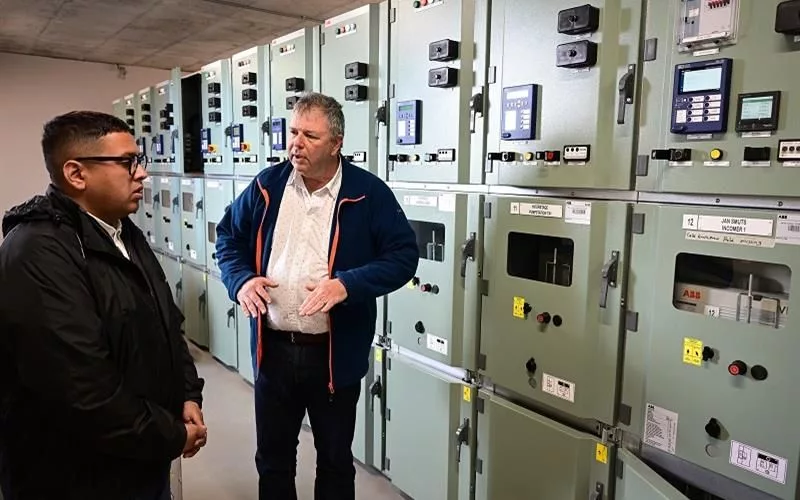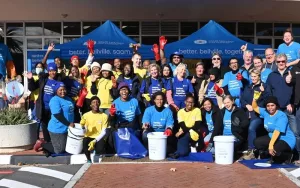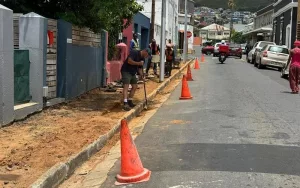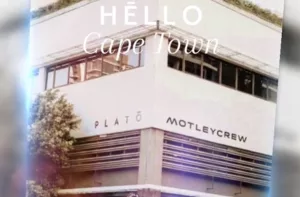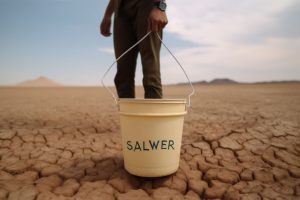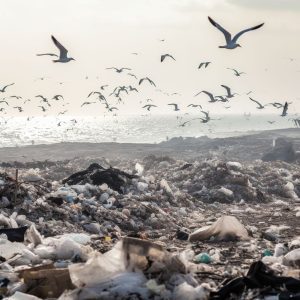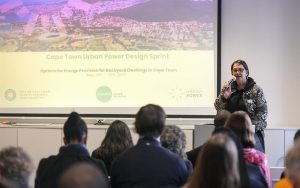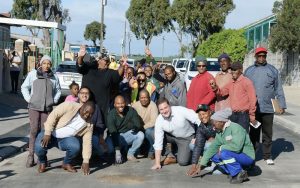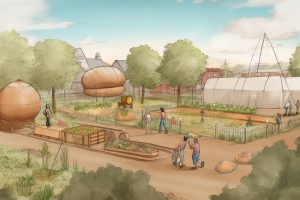South Africa’s Athlone Wastewater Treatment Works transformation project is a groundbreaking initiative that is transforming the way waste is treated. With a substantial capital investment of R4 billion and executed in phases, the project aims to enhance the quality of treated effluent, reduce odours, and ensure a sustainable future for the facility. Phase 2 focuses on enhancing capacity and community impact, including addressing the odour issue, improving sludge management, and refining the inflow system. The project sets a benchmark for sustainable future wastewater management and promises a future where waste treatment aligns with the highest environmental standards.
The Spekboom, a plant indigenous to the Little Karoo in South Africa, has the unique ability to sequester carbon both day and night, making it a valuable tool in fighting climate change. Jobs 4 Carbon, a nonprofit organization, has successfully rejuvenated nearly 700 hectares of land by planting young Spekbooms. The organization aims to capitalize on the plant’s potential through carbon credits, and botanist Alastair Potts praises the Spekboom’s regenerative abilities in restoring the environment and reducing emissions from land degradation.
Unfolding Transformation: The Revitalization of Bellville via Community-Led Innovation
The ‘better. bellville. together.’ initiative is transforming the socioeconomic fabric of Bellville, a suburb of Cape Town, by leveraging community resources, infrastructure, and services to stimulate economic growth. This communitydriven project has successfully created new job opportunities and fostered business contributions and investments in the region. The initiative also prioritizes the promotion of a sustainable future by championing the local circular economy and collaborating with local businesses to integrate sustainable practices. The success of the campaign is attributed to collaboration and community engagement, building on current momentum to create an inclusive, sustainable, and thriving future for the residents of Bellville.
Woodstock city has undergone a massive underground electricity cable project worth R9 million, transforming the energy infrastructure of the city. Over 18,000 meters of underground cabling, 78 new LED streetlights, and a mini substation have replaced the outdated overhead cables and transmission poles. The community’s enthusiasm and cooperation ensured the project’s smooth progress, serving as an excellent example of how a city can overhaul its energy landscape, bringing in a more secure, safe, and visually appealing environment.
The Hessequa Municipality in South Africa plans to combat the energy crisis in the booming town of Riversdale with a R210 million renewable energy project that aims to generate 15 million kilowatthours yearly. The project includes a solar photovoltaic system, a battery energy storage system, and monitoring and control systems, designed to provide a reliable backup during periods of high electricity demand. The initiative is expected to enhance public safety, vital services, and minimize economic losses for businesses while establishing a benchmark for other areas worldwide grappling with similar energy challenges.
In response to the growing demand for sustainable chemical and waste management, the international community has taken significant steps to address the potential impacts of these substances on the environment, public health, and vulnerable populations. One such milestone was the successful adoption of the Global Framework on Chemicals at the Fifth Session of the International Conference on Chemicals Management (ICCM5).
Plato Coffee, a brand born from the dreams of two brothers, has become a prominent coffee venture in Cape Town. The brand, with its 21 cafes, is not just a successful business, but also a means to uplift the community it serves.
On 22 June, the Department of Tourism, in conjunction with the Department of Small Business Development and the Free State Department of Economic Development, Small Business, Tourism and Environment Affairs (DESTEA), organized a community engagement event in Botshabelo, Mangaung. The aim was to provide the youth of Botshabelo with opportunities to upskill and empower themselves in the tourism sector.
Despite recent rain showers, the Western Cape Province’s water situation is still a cause for concern. The hydrological report of May 22, 2023, shows that the Province’s dams are at 61.31% capacity, which is only a slight increase from last week’s level of 60.76%. However, this figure is lower than the same period last year by 2%.
Plastic pollution has become a significant global concern due to its harmful impact on the environment, wildlife, and human health. The production and disposal of plastic present several challenges that require immediate action. The second Intergovernmental Negotiating Committee (INC2) on Plastic Pollution aims to develop a comprehensive, legally binding global instrument to address these challenges.
Energy poverty is a significant challenge facing many communities in Cape Town, particularly those living in backyard dwellings. Backyarders, who often live in informal settlements, face significant energy challenges due to a lack of access to essential energy subsidies, such as the Free Basic Electricity (FBE) offered by the city.
Cape Town is taking a proactive stance on improving its infrastructure, with Mayor Geordin HillLewis leading the charge on a comprehensive sewer pipe replacement project. This critical upgrade aims not only to support economic growth but also to create a healthier and more dignified living environment for all residents of the city.
Deputy Ministers David Mahlobo and Judith Tshabalala recently reaffirmed the South African government’s commitment to ensuring equitable water supply and dignified sanitation for all citizens. Their statements align with the country’s constitution and Minister Senzo Mchunu’s proposed budget for the 2023/2024 fiscal year.
Florida Gators and RAD Youth Centre Collaborate to Create Self-Sustaining Vegetable Garden
A group of young football players from the University of Florida has partnered with Rise Above Development’s (RAD) Youth Centre in Lavender Hill, South Africa. The goal of the collaboration is to create a selfsustaining vegetable garden that benefits the local children and fosters a sense of global unity and understanding.
The 5th Global Conference on Biodiversity Finance is set to take place on May 9th, 2023, in Cape Town, South Africa. The event is a joint effort between the South African Government and the United Nations Development Programme (UNDP) and will mark the 10th anniversary of the Biodiversity Finance Initiative (Biofin). The conference aims to bring together representatives from member countries, government officials, private sector stakeholders, experts, and academics to explore opportunities for biodiversity finance solutions and investments in Biofin countries and regions.
Fashion has always been a form of selfexpression, but the industry has been scrutinized for its environmental impact in recent years. However, in South Africa, a growing number of fashion brands are taking proactive steps toward sustainability and ethical production. From ecofriendly fabrics to upcycling materials, these brands are leading the way toward a more sustainable future for the fashion industry.

